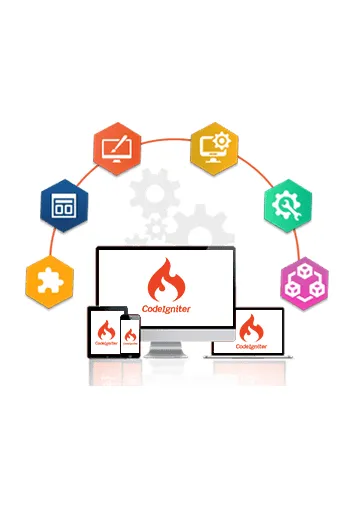Understanding CodeIgniter Development
The Model-View-Controller (MVC) architectural paradigm, which CodeIgniter adheres to, encourages concern separation and improves code organisation. Because of this structure, developers may create applications that are separate but related in terms of presentation layer, data manipulation, and business logic, which promotes scalability and maintainability.
- Lightweight Framework
- MVC Architecture
- Comprehensive Documentation
- Database Support
- Security Features
Dlite Info Tech
Why CodeIgniter Development is Essential for Modern Web Applications

Why CodeIgniter Development is Essential for Modern Web Applications
n the dynamic landscape of web development, selecting the right framework can significantly influence the success and efficiency of your projects. CodeIgniter, a robust PHP framework, has established itself as a cornerstone for developers seeking to build scalable and feature-rich web applications. Here’s why CodeIgniter development is crucial in today’s digital era:
Dlite Info Tech Craft Beautiful Websites That Attract And Convert!
We excel in crafting compelling websites that not only capture attention but also yield outcomes. With a team of proficient designers and developers, we’re committed to elevating your online presence into a stunning showcase. We grasp the significance of crafting not only aesthetically pleasing but also practical websites that captivate and convert visitors into devoted patrons.

what you get
Key Benefits of CodeIgniter Development
When you partner with Numerique, you’ll gain access to our full range of paid SEM services. These services are designed to optimize every facet of your paid advertising, including:
Efficiency and Speed
Vibrant Community Engagement: CodeIgniter boasts a vibrant community of developers who actively contribute through forums, social media, and open-source projects. This community collaboration fosters knowledge sharing, troubleshooting support, and the exchange of best practices.
Customization and Modular Architecture: CodeIgniter’s modular architecture allows developers to extend its functionality with custom libraries, helpers, and plugins. This flexibility enables tailored solutions to meet specific project requirements while promoting code reusability and maintainability.
Integration with Third-Party Libraries: The framework supports seamless integration with a wide range of third-party libraries and plugins. Developers can leverage these extensions to enhance application capabilities, integrate complex functionalities, and accelerate development timelines.
Driving Innovation and Improvement: Community-driven initiatives play a crucial role in shaping the evolution of CodeIgniter. Feedback, contributions, and collaborative projects contribute to framework enhancements, ensuring it remains robust, efficient, and aligned with industry standards and emerging trends.
Security Features
Cross-Site Scripting (XSS) Filtering: CodeIgniter includes built-in XSS filtering to mitigate the risk of cross-site scripting attacks. This feature sanitizes user input data, preventing malicious scripts from being injected into web pages and compromising user security.
Cross-Site Request Forgery (CSRF) Protection: CSRF protection in CodeIgniter helps prevent unauthorized actions initiated by malicious websites that exploit authenticated users’ active sessions. It generates and verifies unique tokens for each request, ensuring that requests originate from legitimate sources.
Input Data Validation: CodeIgniter provides robust input data validation mechanisms to enforce strict validation rules on user-submitted data. This helps prevent common security vulnerabilities such as SQL injection and ensures that only valid and expected data is processed by the application.
Secure Session Management: CodeIgniter implements secure session management practices to protect user sessions from hijacking and unauthorized access. Sessions are encrypted and managed securely, ensuring confidentiality and integrity of session data throughout user interactions with the application.
Scalability
MVC Architecture: CodeIgniter follows the Model-View-Controller (MVC) architectural pattern, which inherently supports scalability. The separation of concerns allows developers to independently scale the business logic (controllers), data handling (models), and user interface (views) components of the application.
Modular Approach: CodeIgniter’s modular approach enables developers to organize and compartmentalize application functionalities into reusable modules, libraries, and helpers. This modular structure facilitates easier scaling of specific components or features of the application without affecting other parts of the codebase.
Database Abstraction and ORM: CodeIgniter provides database abstraction layers and an Object-Relational Mapping (ORM) library like Active Record, which simplifies database interactions. This abstraction allows developers to switch between different database systems seamlessly and optimize database queries for improved application performance as data volumes grow.
Caching and Optimization: CodeIgniter supports caching mechanisms that reduce server load and improve response times by storing frequently accessed data or rendered views. Implementing caching strategies helps maintain application performance during periods of increased traffic and data processing.
Comprehensive Documentation
Clear and Structured Guides: CodeIgniter’s documentation provides clear and structured guides that cater to developers of all skill levels. Whether you are a beginner or an experienced developer, the documentation offers step-by-step tutorials and explanations that facilitate easy understanding and implementation.
Extensive API Reference: The documentation includes an extensive API reference that details every aspect of the framework, including classes, methods, and parameters. This comprehensive reference allows developers to quickly look up specific functionalities and understand how to use them effectively in their applications.
Configuration and Best Practices: CodeIgniter’s documentation covers configuration options and best practices for setting up and optimizing the framework. It provides guidelines on configuring routes, databases, caching, security settings, and more, ensuring developers can configure CodeIgniter to suit their project requirements efficiently.
Examples and Code Snippets: The documentation includes practical examples and code snippets that illustrate how to implement various features and functionalities in CodeIgniter. These examples serve as valuable learning aids and help developers troubleshoot issues or implement complex tasks effectively.
Database Support
tabase Abstraction Layer: CodeIgniter features a powerful database abstraction layer that simplifies database interactions. It supports multiple database types such as MySQL, PostgreSQL, SQLite, and more, allowing developers to seamlessly switch between databases without modifying the application’s code.
Active Record Implementation: CodeIgniter includes an Active Record implementation that provides an intuitive interface for performing database operations. Developers can use method chaining to construct and execute SQL queries, facilitating cleaner and more maintainable database code.
Query Builder Class: The Query Builder class in CodeIgniter offers a fluent interface for generating complex SQL queries programmatically. It helps developers construct queries dynamically based on application logic, ensuring flexibility and efficiency in database operations.
Data Handling and Security: CodeIgniter’s database support includes features for data validation, sanitization, and security. It provides mechanisms to prevent SQL injection attacks and ensures that data retrieved and stored in databases is sanitized and validated according to predefined rules, enhancing application security.
Community and Extensibility
Active Community Participation: CodeIgniter benefits from a vibrant and active community of developers who contribute to its growth through forums, social media platforms, and open-source projects. This community engagement fosters knowledge sharing, collaboration, and continuous improvement of the framework.
Extensive Library of Plugins and Extensions: The CodeIgniter ecosystem offers a wide range of plugins, libraries, and extensions developed by the community. These tools extend the framework’s core functionalities, providing solutions for various tasks such as authentication, caching, form validation, and integrations with third-party services.
Customization with Custom Libraries and Helpers: CodeIgniter’s modular architecture allows developers to create custom libraries, helpers, and components tailored to specific project requirements. This extensibility enables developers to encapsulate reusable code, streamline development workflows, and enhance application functionality without modifying the core framework.
Integration with Third-Party Packages: Developers can seamlessly integrate third-party PHP libraries and frameworks with CodeIgniter, leveraging additional functionalities and enhancing development capabilities. This flexibility allows for a modular approach to development, where developers can choose the best tools and solutions for different aspects of their projects.
Creating Success
Why CodeIgniter Development Services Outshine the Competition
Efficiency and Rapid Development
CodeIgniter's lightweight framework and MVC architecture facilitate rapid development cycles.
Flexibility and Customization
CodeIgniter offers extensive customization options with its modular architecture.
Comprehensive Documentation and Support
CodeIgniter is backed by comprehensive documentation and a supportive community.
“Numerique PPC service is light years ahead of the competition because of their intelligent, specialized and courteous account managers.”
Director of Marketing

CodeIgniter Development: Demonstrating Effective Solutions with Reflective Success
In the realm of web development frameworks, CodeIgniter stands tall as a versatile and powerful tool that continues to prove its effectiveness in delivering successful outcomes for developers and businesses alike. Known for its efficiency, flexibility, and robust features, CodeIgniter enables developers to build scalable and feature-rich web applications with ease.
Results-Driven
Client-Centric
Innovative Techniques
Client Success Stories
FAQ
FAQs about Codeigniter Development
Would you like to learn more about developing CodeIgniter for your websites? Look over our FAQs:
CodeIgniter is a powerful PHP framework known for its lightweight footprint and MVC architecture, which promotes rapid development and scalability. It’s ideal for building robust and secure web applications efficiently.
To start with CodeIgniter, you can download the framework from its official website, configure it in your development environment, and explore the comprehensive documentation and tutorials available. These resources provide step-by-step guidance on setting up, configuring, and coding with CodeIgniter.
CodeIgniter offers features such as a built-in ORM (Object-Relational Mapping) system, database abstraction layer, form validation, security features (like XSS filtering and CSRF protection), and a robust caching system. Its advantages include flexibility, scalability, and a supportive community that contributes to its continuous improvement.
CodeIgniter allows for easy extension through custom libraries, helpers, and third-party plugins. You can integrate additional functionalities, such as authentication systems, payment gateways, and API integrations, to tailor the framework to meet your project’s unique needs.


